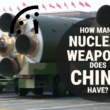India and Pakistan: Very far from Kansas
By Rabia Akhtar, October 27, 2016
The United States does not enjoy the same leverage over Pakistan that it once did. Washington never had much leverage over India. So my roundtable colleague Mario Carranza's idea that Washington can "force" New Delhi and Islamabad to "stop their nuclear arms race and take arms control seriously"—even as the United States modernizes its own nuclear arsenal—lacks historical rigor.
The argument I have made against "too much Uncle Sam" doesn't mean I favor eliminating the United States from the Indo-Pakistani equation. It may well be decades before Washington recedes as an extra-regional force in South Asia. I am only suggesting that early US interventions in South Asian crises embolden the two sides to explore limited war options (even if India and Pakistan have historically welcomed such interventions).
Carranza writes that Washington's "ultimate goal in the region must be denuclearization." I would agree if we were living in fantasyland. But we aren't. Choices have been made. They are reflected in New Delhi and Islamabad's decisions to stand outside the nuclear nonproliferation regime—decisions not to accept organized hypocrisy. Choices are reflected in Pakistan's shifting alliance patterns, with China and Russia drawing closer. For its part, India declines to put all its strategic eggs in the US basket despite the completion of the Indo-US nuclear deal and Washington's push for Indian membership in the Nuclear Suppliers Group. Gone are the days when US leadership was the "key," as Carranza has it, to solving the subcontinent's problems. Dorothy in The Wizard of Oz was right—we're not in Kansas anymore. Never will be again.
Neither fragile nor isolated. I write this soon after a horrific suicide attack on a police training academy in Quetta, in Pakistan's province of Baluchistan. More than 60 young cadets were killed in the attack. So I understand why my colleague Jayita Sarkar writes that the "fragile Pakistani state might fall apart." From a distance, one might wonder how Pakistan is still standing even now.
But it's also important to note Pakistan's ability to bounce back from terrorism. It's important to credit Pakistan for the Zarb-e-Azb military operation that has eliminated terrorist hideouts in North Waziristan. Pakistan is a resilient nation. Resilient nations aren't fragile. This deserves acknowledgement.
Sarkar links Pakistan's "fragility" to its alleged isolation. Since the militant Uri attack against an Indian military outpost on September 18, a narrative about Pakistani isolation has been popularized in India. But the claim doesn't bear scrutiny. For example, Sarkar mentioned a conference of the South Asian Association for Regional Cooperation (SAARC), which had been scheduled for Pakistan next month. The conference was postponed because some nations pulled out. But this is very weak evidence for Pakistani isolation—the SAARC summit is automatically canceled if even one member country withdraws. Meanwhile, evidence against Pakistani isolation abounds. The China-Pakistan Economic Corridor is poised to attract $150 billion in investment—but it's not only Pakistan's "buddy" China that is investing. Iran is also interested, and would be welcomed into the economic corridor by both Beijing and Islamabad. In September, Russian and Pakistani troops held their first-ever joint military exercises. And a team from the International Monetary Fund, after a visit to Pakistan just this week, acknowledged that Pakistan has emerged from its economic crisis and is on the way to instituting needed economic reforms. Isolation? Think again.
Sarkar also tied the risk of a Pakistani "implosion" to the prospect of nuclear proliferation. This sort of argument has long since lost steam. Sure, it's easy to bring up A.Q. Khan—and "rub it in"—while making a case about Pakistan and nuclear proliferation. But why is it so difficult to credit Pakistan for the steps it has taken to prevent the emergence of A.Q. Khan 2.0?
There is only one way for Pakistan to go—forward. India can either wish Pakistan success and prosperity or wish Pakistan failure and chaos. There are no other choices. A frozen-in-time political dialogue doesn't help either country.
I agree with Sarkar that India and Pakistan need to conduct bilateral dialogue toward nuclear stability—but in South Asia, nuclear stability isn't just one thing. It is a combination of political stability, deterrence stability, and crisis stability. As long as the bilateral political environment itself isn't stable, neither deterrence stability nor crisis stability can be achieved.
At all costs, India and Pakistan must talk.
Topics: Nuclear Weapons
Share: [addthis tool="addthis_inline_share_toolbox"]














